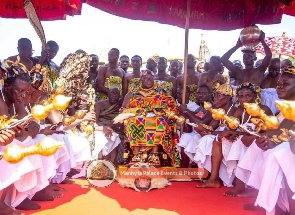 The Asantehene, Otumfuo Osei Tutu II, Special Guest at this year's Hogbetsotso, delivers his speech
The Asantehene, Otumfuo Osei Tutu II, Special Guest at this year's Hogbetsotso, delivers his speech
It was short and very relevant to the occasion. Otumfuo Osei Tutu II did not spend time gloating over the achievements of his long reign. The 12-minute speech was chock-full of the history of our people dating back to pre-colonial times. The alliance between the Anlo State and Asanteman goes back to 1869 – a time of tribal wars and slave raids when allies were needed.
The Otumfuo said he was the first occupant of the Golden Stool to set foot on Anlo soil in the modern era. Some accounts say the very first Asantehene to do so was one of the Karikaris. That was more than a hundred years ago.
The Asantehene stated that the perceived differences between Asante and Anlo were not the result of any inherent animosities between them but the doings of modern-day politicians.
“I am not unmindful of the fact that the complexities and vagaries of modern politics have cast an often uncomfortable shadow over our relations. It is undeniable that our people have become associated with differences in political choices to an extent that has injected some unwarranted mistrust and compromised the brotherly harmony conceived by our forefathers.”
He cited aspects of our modern history to back his assertions. The personal element in that part of the speech was a master stroke that directly addressed the political differences among the tribes of our country – one of the weakest spots in our still-fumbling experiment with western democracy.
During the Second Republic, the Otumfuo’s own elder brother, Barima John Francis Kwabena, made a bold and controversial attempt to bridge that gap by sticking his head out from the brood and becoming the national chairman of the National Alliance of Liberals, a party led by K. A. Gbedemah, an Anlo man.
The Otumfuo pointed out that Gbedemah lost because the political odds were heavily stuck against him at a time of widespread anti-Nkrumah sentiment. He said the loss had nothing to do with Asante or any ethnic considerations. Gbedemah’s political base was the old CPP structures which had been effectively destroyed together with Nkrumah’s legacy.
K. A. Busia’s party won a resounding victory (with great support from the Ashanti Region). Gbedemah was denied the seat that would have made him leader of the Parliamentary opposition by people who invoked Article 71 of the 1969 Constitution against him. Events from the First Republic had come to haunt him.
Nkrumah had almost successfully stamped out tribal groupings in our party politics and a large proportion of Ewes teamed up with the Akans to form the only parliamentary opposition to Nkrumah and the CPP before the institution of the one-party state. In the early 60s, Busia was one of the most popular politicians in the then Volta Region.
All this was to change during the Second Republic. The tribal alignments in our civilian politics forged at the time have remained the same ever since. The Otumfuo blamed this on the politicians, not the Nananom. He said we should “learn to separate the machinations which drive the conducts of individual politicians from the roots of their births or religious orientations”.
The ceremony was not an occasion for partisan politicking even though some people tried to make it so. The festival was a huge success. The presence of the Asantehene and the other chiefs was an affirmation of what unites us. The different cultural displays remind us of the very best in us. We were doing these dances and performing these rites long before the white man came with his foreign religion to divide us.
The Otumfuo’s speech, by necessity, contained many local names the pronunciations of which can be nightmares for anyone who grew up speaking Asante Twi. Perhaps his minders did not give him sufficient time to practice his Ewe phrases. Not only did he struggle with the pronunciations of “Anlo” and the name of the festival itself, but he also had to surmount the very arduous task of saying “Afro Gbedemah” and “Togbe Sri”. He gave them his best shots and was rewarded with genuine applause for what was actually a well-crafted speech.
At a time when our political leaders have disappointed all of us with their vicious lies, fake promises, arrogance, clannishness, incompetence, and self-seeking aggrandizement, our traditional leaders owe it as a duty to all of us to rise above the fray, bring us together and shame the politicians.
The Asantehene put it very succinctly when he said that the “traditional leaders of this nation, as the guardians of our heritage, face an obligation to place peace-building, the sustenance of the unity and the protection of the territorial integrity of the nation at the zenith of all considerations”.
The chiefs who gathered at Anloga are showing us the way. Some of them also happen to have some good speechwriters...